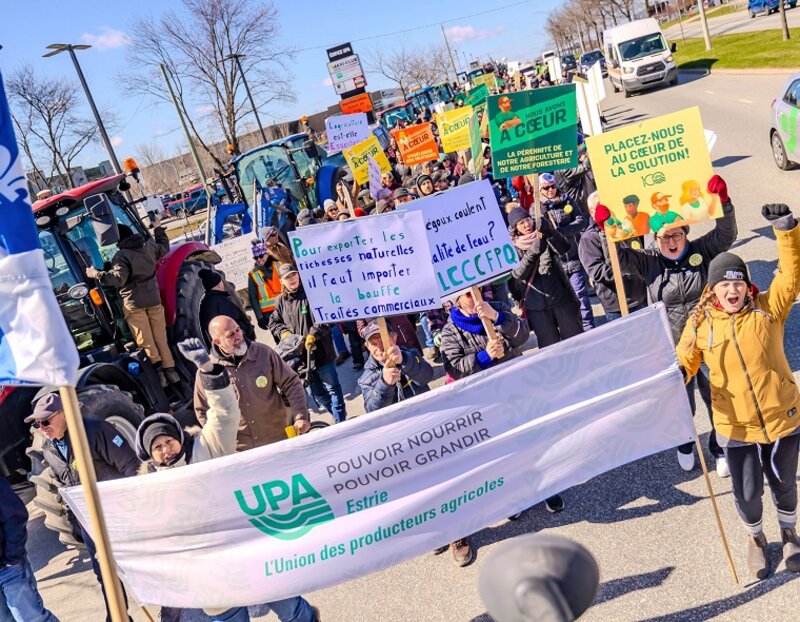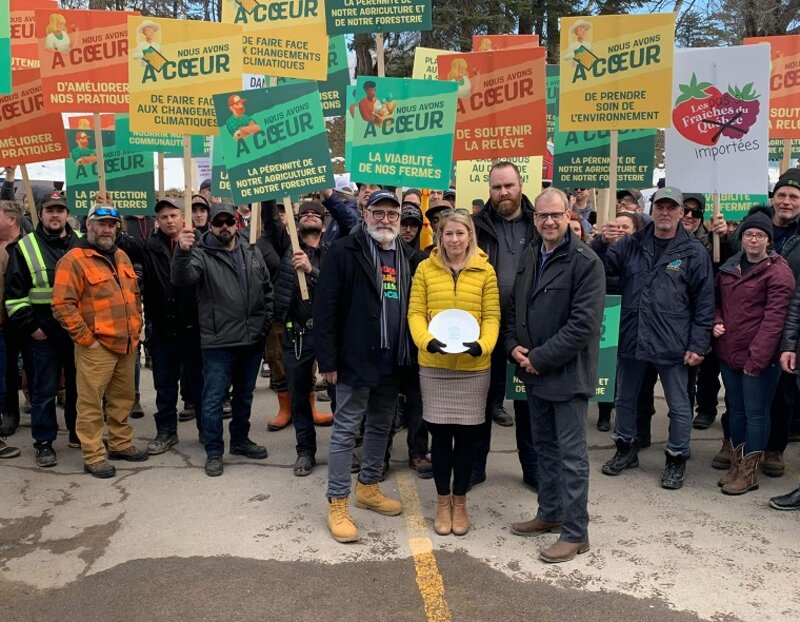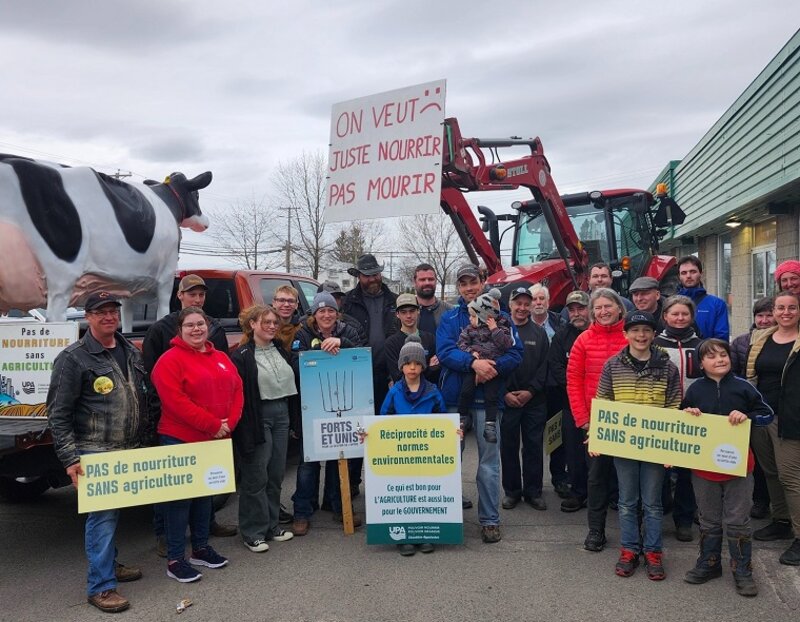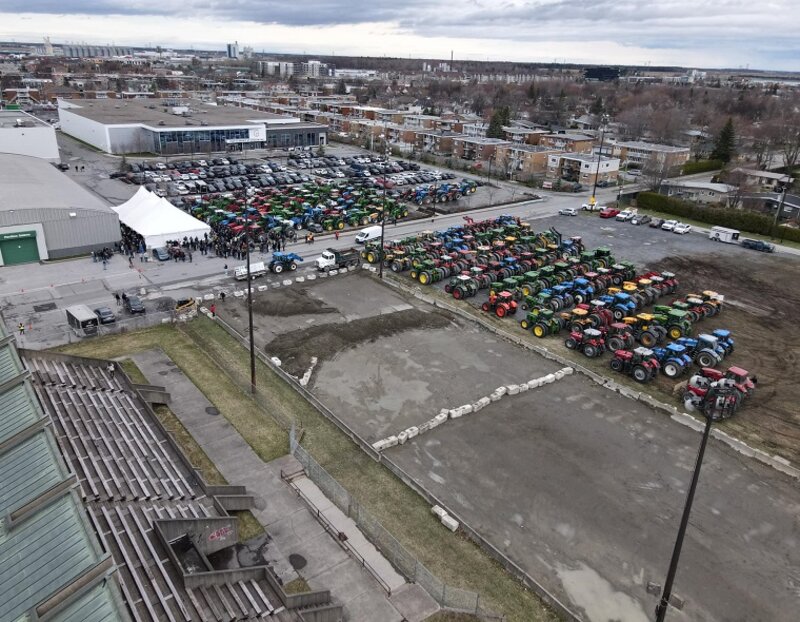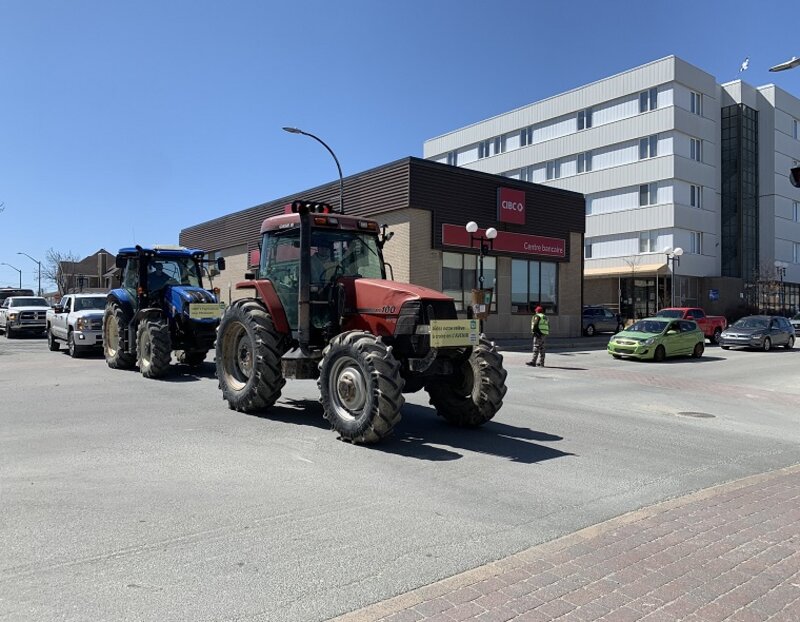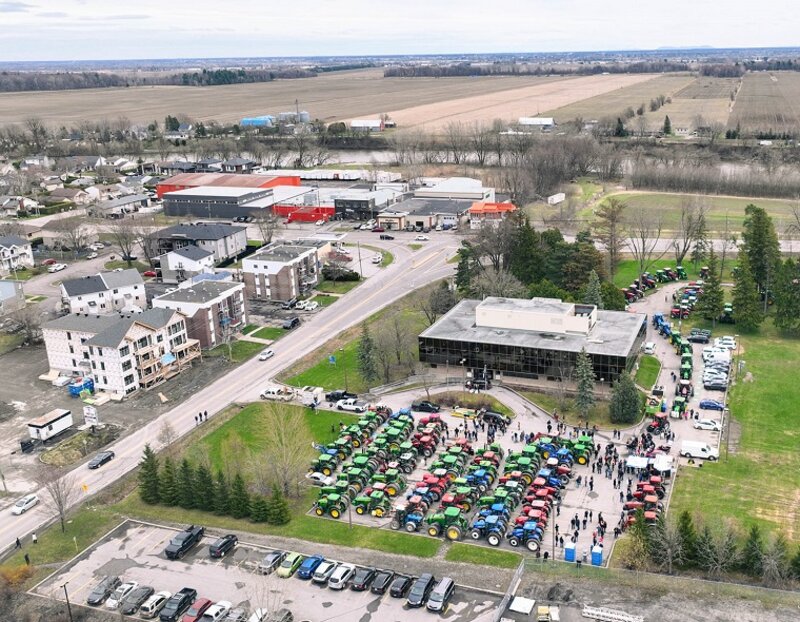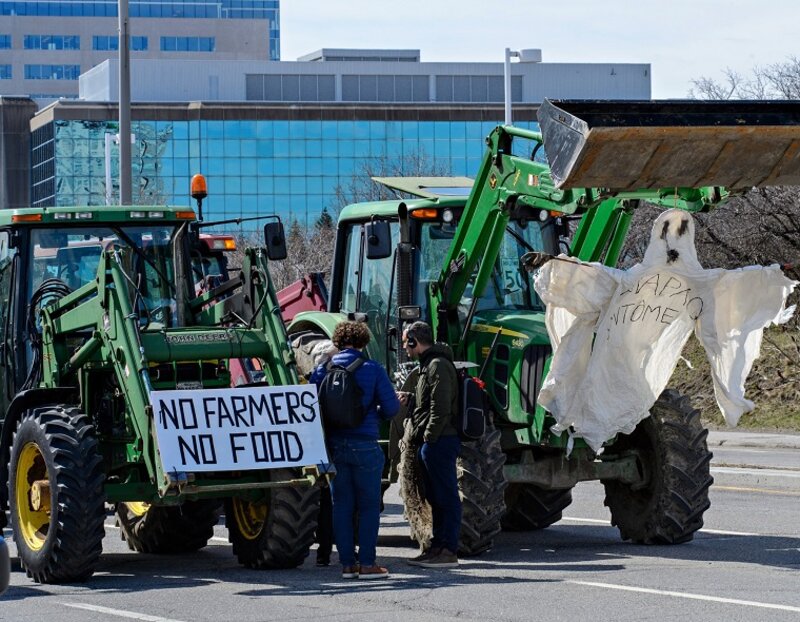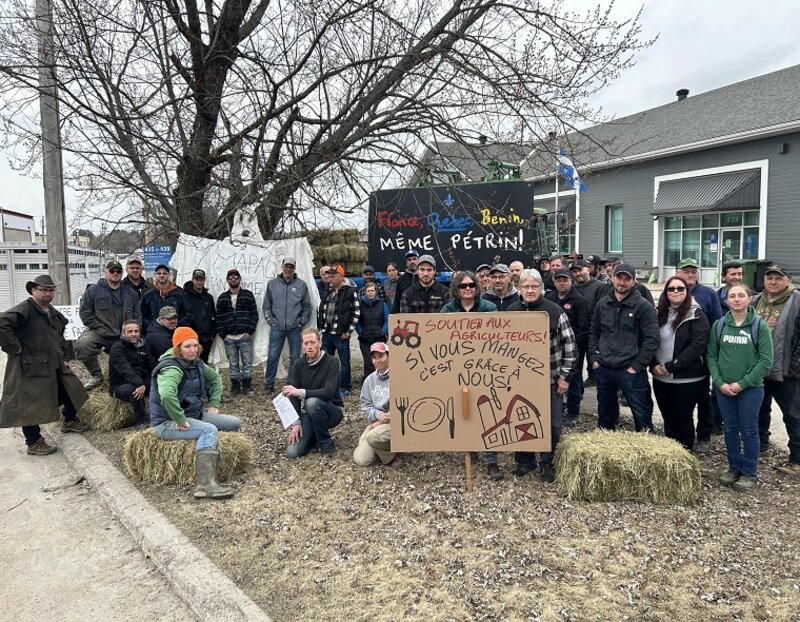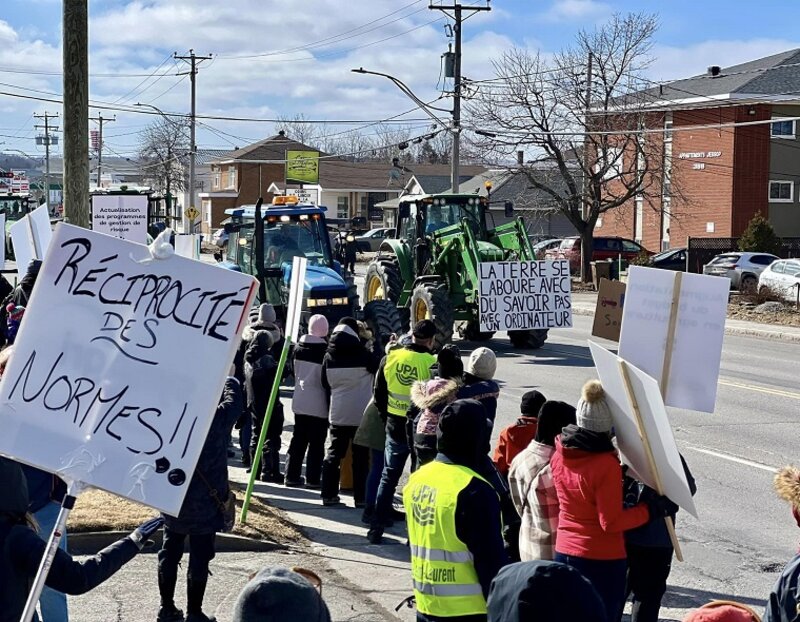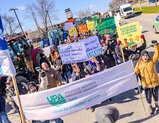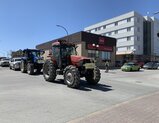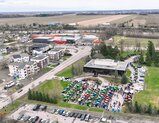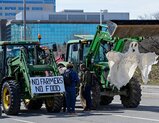Put us at the heart of the solution!
In favour of a viable and sustainable agriculture and forestry sector.
To ensure young farmers continue seeking out their livelihood in this sector with confidence.
So that our next generation of producers, our farmland, our sugar bushes, and our family farms will still be here 100 years from now.
To provide healthy food and actively foster the resilience of this land.
The new bio-food policy must be strong and fully equipped to handle the economic, environmental, and social norms that now pervade the world in which we operate: cutthroat, globalized, and rocked by climate change.
Quebec's producers must be at the heart of that societal project.
They face major economic, territorial, climatic and environmental challenges, which affect them not only in their fields but also in their hearts.
input prices soaring from inflation, interest rates ratcheting up and up, horrendous weather conditions severely damaging crops—and all this amid an ever-stiffer regulatory environment, labour shortages, and massive pressure on farmland.
They are more than 42,000, wishing they could continue feeding Quebec.
They are calling for a groundswell of support from citizens and government in favour of a viable and sustainable agriculture and forestry sector.
We must enable them to make good living from their work.
Regional mobilizations
Throughout Quebec during the first five months of 2024, producers crisscrossed the countryside and came out in huge numbers to regional demonstrations, expressing their concerns and hopes for the future of agriculture and the next generation. Precious hours usually devoted to running their businesses and tending to farmwork were instead spent sending the message that farmers are fed up.
Here are some photos taken during the events:
Short-term measures in response to the crisis
On 2024 June 13, Minister Lamontagne confirmed that six measures totalling $233.6 million were set to be adopted in short order.
Throughout the mobilization, farmers in Abitibi-Témiscamingue have been underscoring the need for supplementary supports to existing programs given the exceptional drought experienced in the region in 2023.
Accordingly, the Quebec government plans to develop a departmental initiative specifically to address this issue, which is such a critical one for businesses in the region. Eligible farmers may tap into a $1.6-million fund dedicated to securing adequate feed for cattle, sheep, and goats.
Note that farmers will be able to access this support whether or not they have coverage under Crop Insurance.
| Financial assistance parameter | Eligible livestock type | |
|---|---|---|
| Beef cows, dairy cows, fed cattle | Sheep and goats | |
| Amount per eligible head | $150 / head | $20 / head |
| Minimum assistance provided per applicant | $1,500 | $300 |
| Maximum assistance provided per applicant | $50,000 per applicant during the initiative period | |
In 2023, in response to our Agriculture sous pression (Agriculture under pressure) mobilization effort, the Quebec government created a $25 million emergency initiative in the form of working capital loan guarantees. These provided low-cost refinancing for some 1,300 businesses (on a maximum of $167 million in private loans).
Several aspects of the initiative will be revised. In addition to $30 million in added funding, these include an increased financial assistance rate, the ability to use the support in conjunction with an existing loan, and opening the initiative to non-clients of the Financière agricole du Québec (FADQ), bringing the number of supported businesses to 3,000.
In 2023 and 2024, the UPA repeatedly stated (with the numbers to prove it) that interest rate hikes were significantly sapping profitability on thousands of Quebec farms. This was especially true for those in the start-up phase, which face higher debt levels. In response, the Quebec government intends to adapt the Secure Rate for Aspiring Farmers component of the FADQ’s Protection against Interest Rate Hikes program for the two-year period spanning April 1, 2024, to March 31, 2026:
- Instead of 5%, 6%, or 7% (depending on the case), the threshold rate above which 100% of interest is covered by the program will now be 4% across the board.
- Businesses will now be eligible for the Aspiring Farmer component beyond the current limit of five years.
In August 2023, the UPA and several horticulture-sector organizations called for urgent assistance in the wake of extreme weather events that had hit hundreds of producers hard in most regions of Quebec in the preceding weeks.
This outcry resulted in an application to the Canadian government in November 2023 through the federal-provincial AgriRecovery initiative, a disaster relief program.
In the end, financial assistance covering 70% of eligible expenses will be paid out to horticultural producers (namely strawberry, raspberry, and field vegetable producers) in the affected areas. Officials at both levels of government aim to finalize the details as quickly as possible.
A significant enhancement to the Agri-Québec Plus program has also been planned to provide a year’s worth of one-time support for strawberry, raspberry, field vegetable, and processing vegetable producers (namely $50,000 per shareholder above the current ceiling, to a maximum of $200,000 per business).
The two components (AgriRecovery and Agri-Québec Plus) will provide a total of $22 million in added support.
For several years, our farm and forest producers’ continued adaptation to new environmental and climatic conditions has been severely put to the test by various legislative, regulatory, and financial pressures. These pressures place added burden on the shoulders of producers, stall their development, and limit their capacity to innovate.
As a result, the Government of Quebec announced the coming into force of 14 regulatory and administrative relief measures allowing producers to generate savings of $36.9 million (some measures have already been announced).
See the full list of relief measures (182 KB)
The Quebec government also plans to replace the current moratorium on expanding cropland—which has been in place since 2004—with a new regulatory framework that will recognize beneficial environmental practices.
For years, the UPA has been calling for adequate support for climate change adaptation. In response, the government will be implementing a new measure with an initial budget of $20 million to support this component, as part of its 2023 Implementation Plan under its 2023 Plan for a Green Economy.
The upcoming implementation plan is set to include programs to reduce emissions unique to the agricultural sector (with $62 million to be put towards research and promising technologies), as well as other programs open to multiple economic sectors to reduce emissions and advance the green transition.
Certain actions designed to complement the 2020–2023 Sustainable Agriculture Plan are also included in the second action plan of the 2018–2030 Quebec Water Strategy. These will amount to $24 million over the next four years and include improving agri-environmental practices on coastal farmland and added support for managing farm waste.
Our work is not finishedThe measures announced by the Quebec government reflect a short-term openness to the sector’s demands, but the work is far from finished. In the medium and long terms, the renewal of Quebec’s Bio-Food Policy (which starts next year), will be decisive, particularly in terms of significantly increasing budgets, support, guidance, measures and programs for producers, and the next generation of producers. Farmers are the main architects of the most important social project of all, namely feeding Quebecers sustainably. The next policy must be consistent with this great responsibility by paving the way for fair agricultural policies that allow the people who farm this land to make a decent living from their work. |
